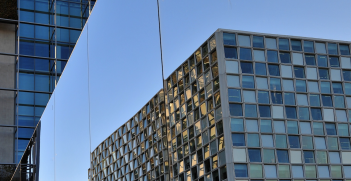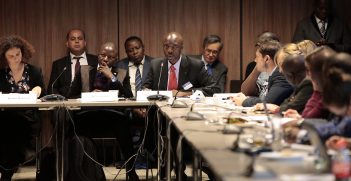Rule or Ruse of Law in the UN International Criminal Court?

Fundamental to the rule of law is equal treatment and non-arbitrary, fair application of law. Instead, the International Criminal Court (ICC) exemplifies UN politicisation of international law principles and bureaucratic corruption of the rule of law, at extravagant cost.
On 30 April 2020, the prosecutor of the ICC filed a response to the submissions of amici curiae, victims, and States participating in Court processes in the “Situation in Palestine.” The response provides insight into the struggling Court’s betrayal of its fundamental role of protecting the rule of law.
The ICC is a UN agency that was established in 2002 to prosecute the most heinous international crimes where there is no national court that can do so. With convictions in only four cases in 18 years, it is doubtful that potential offenders are deterred. The eight convictions have all been for crimes in Africa where national courts were notionally unable to prosecute. Due to its prosecutions exclusively of Africans, a collective move (later suspended) by African countries to renounce the ICC was debated in the African Union. Ultimately, the ICC is relegated to the role of signalling for the international community that there is no impunity for the gravest inhumanities. In other words, its function is primarily symbolic.
With headquarters in The Hague, Netherlands, 800 staff, and field offices elsewhere, it is expensive to run: over €1.5 billion so far, with increasing annual costs now running at just under €150 million per annum. Australia provided AUD $9.1 million (over €5.5 million) in the 2018-2019 financial year.
More worrying is doubt over what the ICC symbolises in actual practice. Its brand is tarnished: it is a UN body political in essence, defective in execution and undermining the very tenets of law it was set up to protect.
The ICC is constituted under the Rome Statute, in which some elements are overtly political, such as a revised definition of a war crime (Art. 8(2)(b)(viii)) formulated by negotiators in response to pressure from the Arab League to criminalise Israel allowing its own civilians to move into occupied territory . Its amended definition of international aggression (Art. 8bis) is vague, incoherent, and undermines national rights to self-defence. Most UN Security Council permanent members and the emerging global powers declined to sign the Rome Statute. Ideally, formulation of the world’s most heinous international crimes should be unanimous, obvious, clear, and certain.
A more pervasive and corrosive influence than these specific treaty provisions are the political operations of the ICC institutional apparatus. The three central institutions are the office of the prosecutor, the chambers of judges, and the governing assembly of states, all supported by a fourth arm, the registrar. The assembly of states is a political body that, inter alia, appoints court staff partly upon standard geo-political selection criteria. The panel of judges are susceptible to self-interest among political considerations. For instance, an absolute majority of 14 judges decided in plenary session in 2019 that ICC judges can serve as national ambassadors without breach of the court’s explicit statutory requirements that judges not engage in professional occupations or political activity.
The prosecutor is an officer within the court, as in European court systems, and like the judges, is a supposedly politically neutral legal expert. The prosecutor is the most important single person within the ICC and has a fundamental role in selecting and framing cases. The history and conduct of the current prosecutor casts doubt over her office and thereby of the ICC itself. Fatou Bensouda is accused before the Truth Reconciliation and Reparation Commission in her native Gambia of responsibility for torture and arbitrary political detentions, dating back to when she served as district prosecutor and chief legal adviser to Yahya Jammeh, a dictator who initiated a wave of repressive atrocities after taking over the country in a coup in 1994. The need to adjust the UN ICC optics of prosecution by white men of Africans necessitated her appointment as prosecutor in 2012, despite the above history and other concerns.
The prosecutor’s current conduct gives rise to a reasonable apprehension of bias in a major case, namely the investigation of Israel for crimes in the “Situation in Palestine.” Journalists report that the prosecutor maintains close liaison with figures in the Palestinian Authority. Veteran Palestine Liberation Organization official Saeb Erekat disclosed that he chairs the liaison committee and that it includes representatives of Hamas and the Popular Front for the Liberation of Palestine, both of which are internationally listed terrorist organisations accused of crimes against humanity under the court’s jurisdiction. Despite having noted that the Palestinian Authority has “encouraged and provided financial incentives for the commission of violence through their provision of payments to the families of Palestinians who were involved, in particular, in carrying out attacks against Israeli citizens, and under the circumstances, the payment of such stipends may give rise to [UN ICC] crimes,” Bensouda saw no problem meeting with the Palestinian Authority prime minister, Muhammad Shtayyeh — himself a potential defendant. There is no plea-bargaining in the ICC and it is unethical and unprofessional for any prosecutor to collude with potential defendants.
Moreover, although the prosecutor requested a decision from the pre-trial judicial chamber as to whether the ICC has jurisdiction to prosecute Israel, which never joined the court, the prosecutor’s office is reported as having told the Palestinian Authority that it is proceeding anyway with launching investigations of Israeli leaders. It is disingenuous to do so while awaiting the chamber’s decision, especially as the purported reason for requesting it in the first place was to avoid a waste of resources.
This dismal analysis is reinforced by the prosecution’s inadequate responses to participants in the “Situation in Palestine,” submitted on 30 April. The submission capriciously disregards some and is disingenuous in treating other legal issues raised by the amici, merely going through motions. It notes that “silence on a particular point raised by a participant should not be taken as expressing either the Prosecution’s agreement or dissent, the Prosecution is content for the Judges of the Chamber now to decide the matter.” Thus, the prosecutor improperly seeks to deploy judges prior to initiating an investigation as a tactical political cover.
The ICC statute provides (Art. 42(7)) that “Neither the Prosecutor nor a Deputy Prosecutor shall participate in any matter in which their impartiality might reasonably be doubted on any ground.” Ample evidence of prosecutorial bias can be found in the prosecutor’s actual request to the pre-trial chamber. Its citations of academic literature are partial: they cite anti-Zionist academics while conspicuously omitting authoritative pro-Zionist academic literature. The submission also retells the conflict history in politically biased terms that implies that it was researched and written by lawyer activists contracted to undertake the task. Their account cleanses any mention of West Bank Arab terrorism or Gaza rocket attacks against Israelis as context for Israeli defence activities.
Ultimately, the ICC is not just another UN institutional vehicle for the political-legal campaign announced by the Palestinian Authority and the Arab League . The ICC prosecutor is their active collaborator engaged in lawfare. Even though UN policy and executive institutions are politicised by constitutional necessity, and are commonly used as vehicles for narrow national interests, this is a new brazen descent by an international judicial body.
The ICC was meant to symbolise the universal rule of law and the end of impunity. However, in practice it has come to symbolise the opposite. It exemplifies UN politicisation of international criminal justice principles and corruption in dispensation of the rule of law, at extravagant public cost.
Gregory Rose is a professor of law at the University of Wollongong in Australia.
Maurice Hirsch is Head of Legal Strategies for Palestinian Media Watch.
This article is published under a Creative Commons Licence and may be republished with attribution.





